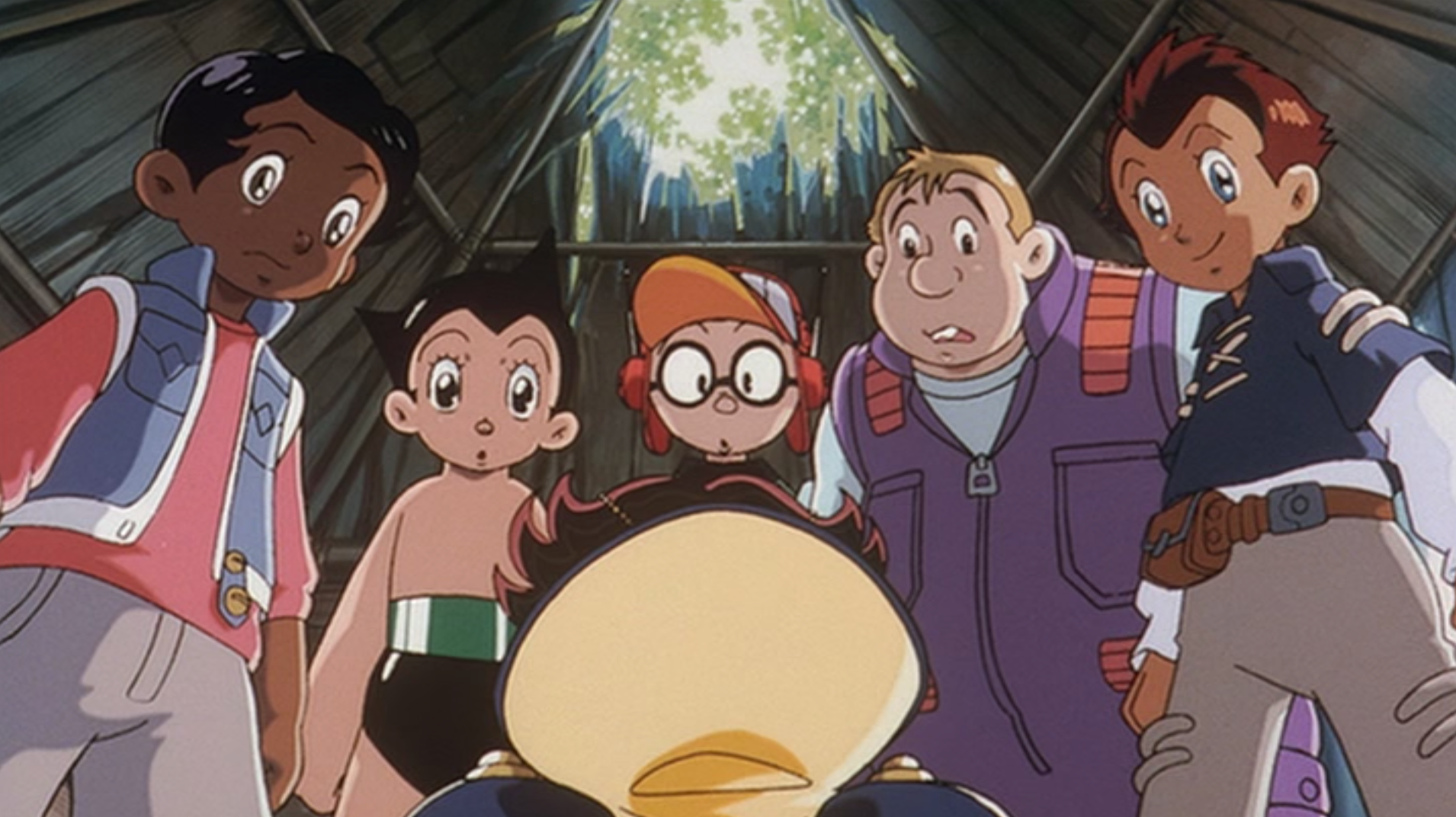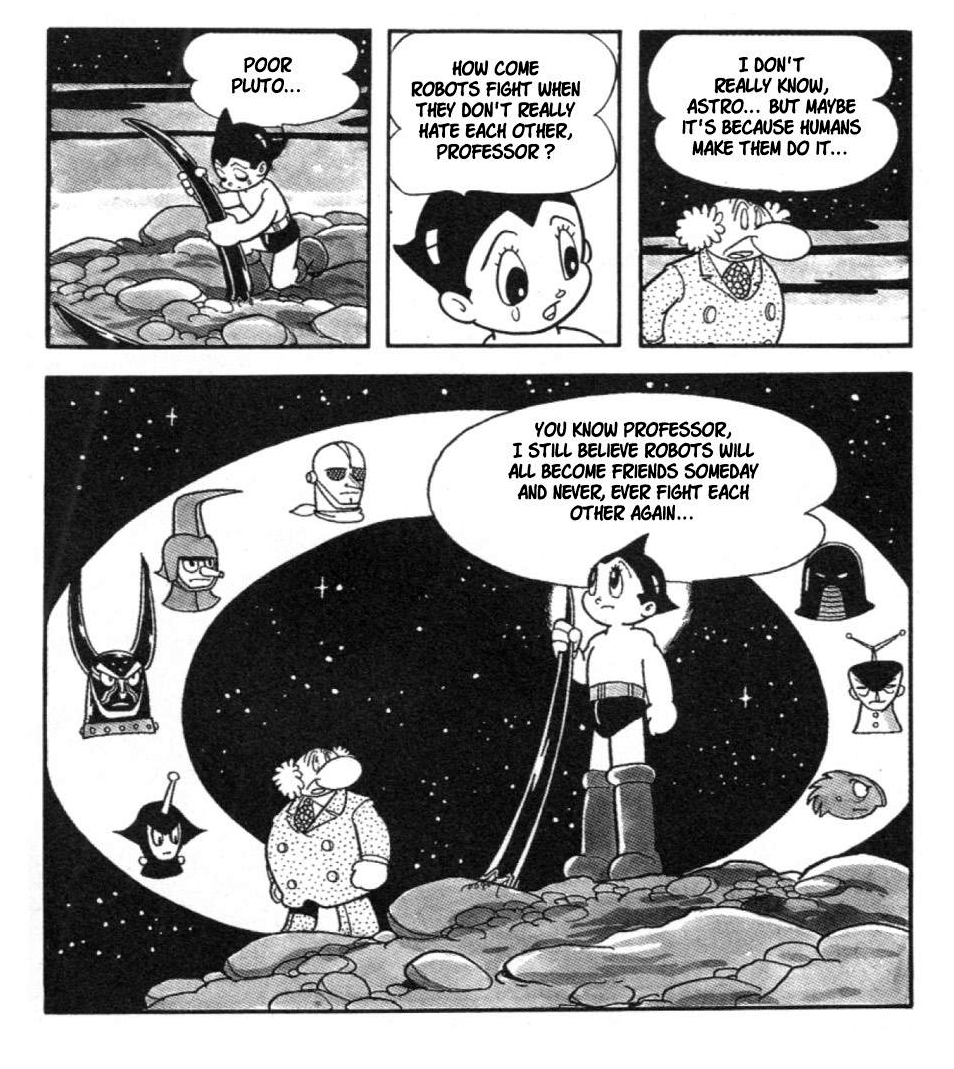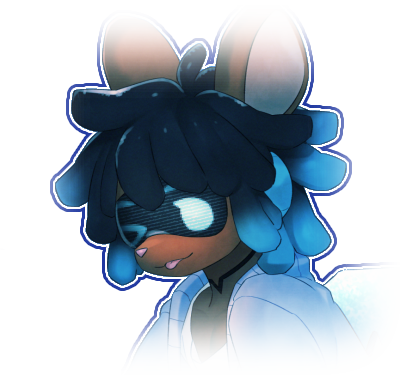Now or Never: My journey with Astro Boy
November 5, 2024
This is very well-timed, as Osamu Tezuka's birthday was on the 3rd! Happy birthday, king.️
A little while back I decided to look into the Astro Boy 2003 adaptation. Concurrently, I began reading stories in the original manga, though with less frequency. My main experience with the works of Tezuka was Black Jack, who I LOOOOVE TO DEATH. But I thought, hey! Let's look at Astro Boy, an unambiguous influence on Mega Man, one of my favorite series. I felt like I owed that much to the little guy.
I understood going in that the 2003 adaptation of Astro Boy wasn't exactly the "truest" adapt of Tezuka's vision; it was the first animated Astro Boy work made after his death, and takes all sorts of liberties with his original stories while keeping a DNA true to the themes present in prior depictions, offering a unique new take on the boy hero. Many friends of mine had spoken very highly of it, however, so I felt it would be nice to check it out alongside the original manga and get an idea of the series in its purest form and in an updated form.
The manga has such a charming, well-aged look in its simplicity. The designs are so timeless (well. aside from the questionable caricatures) and Tezuka's rubberhose-inspired style is really fun and easy to enjoy as you go from panel to panel. There's an admittedly funny juxtaposition when tragic moments or acts of serious violence are presented with a slapstick-like visualization, but it all adds to the appeal of the whole package I think.
My first two thoughts after the first ten or so episodes of the anime, meanwhile, were 1. "wow, this is gorgeous". and 2. "wow, I should've looked at this sooner". It's an absolutely beautiful looking series; one of the last cel-shaded anime to be made, and it maintains an almost movie-quality animation for the entirety of its 50-episode run. Tezuka's designs are "updated" beautifully- I especially love Dr. Tenma's appearance here, as well as this take on Tamao. Both the anime and manga also touch on things that I had always liked out of Mega Man and wanted to see more of. Mega Man's robot conflict and how this affects society is understandably more of a footnote and a thing to get the games rolling, but Astro Boy delves into these subjects more meaningfully as part of its episodic storytelling structure. The societal aspect is big here, with different episodes and chapters focusing on how various humans and robots perceive each other, and sometimes inciting greater conflicts. There's plenty of action as kid Atom flies through foes and performs great feats of strength, but there's just as much heart in the associated stories. By today's standards, the story of robot coexistence here may not be a particularly novel one, but it's for the most part no less entertaining or well-executed here in Astro!
Astro Boy is a strongly episodic kind of story, but there is such a great variety of adventures to follow like any good episodic that I wasn't really thinking about the lack of a plot structure. Some tales are more dramatic, while some have a more sci-fi bend. Some are lighter and more slice-of-life, while some are more adventurous. Fifty episodes in the 2003 anime, and all of them are fun and never felt stale. One of my personal favorites was "Goodbye Princess", where a princess from another country comes to visit and Astro and his friends show her around their home and help her deal with her malicious cousin. Another favorite was "The Robot Who Longed To Be Human", a gloomier noir-like story where Astro and the robot officer Delta try to track down a former police espionage robot turned rogue. The English release of the manga's first volume starts not with Astro's origin, but a tale Tezuka picked out himself as the opener, which perfectly highlights the range of creative stories you'll find here: "The Hot Dog Corps", a story about dogs whose souls are placed in robots to become soldiers. No two Astro Boy stories are alike and across all mediums they tend to touch on pretty much every thing you can think of. I love when an Astro story ends, if only because it means I get to see what the next one will be!

Astro Boy is just as often fun and adventurous as it is dramatic and compelling.
While the Astro Boy manga has a solid sense of continuity, it has little in the way of an overarching narrative. Particularly unique to the 2003 version of Astro Boy, meanwhile, is a firmer attempt at a loose overarching story. The main element is the increased presence of Dr. Tenma, Astro's creator and father turned mad scientist, who occasionally shows up to throw new challenges at Astro in the name of spurring his "evolution" and convincing him to become ruler of the robots. This version of Dr. Tenma is particularly compelling thanks to the emphasis on his severe complex regarding Astro and his larger role as the ovearching villain, whose plans become increasingly dangerous as the story progresses into its second half. There's a super palpable sense of increasing tension in the world within the last 25 episodes; acts of terrorism and control take center stage more and more, and a character starts to appear known as the Blue Knight— a charismatic and compelling revolutionary who wants to establish a free nation for robots. There's still plenty of fun stories to be found as the series approaches its conclusion, but the way you can feel things ramp up in the background and converge towards the climactic finale is just... mwah, excellent. Astro's world is slowly shifting towards something big, and you can only hope the little guy will be able to carry that weight.
Fun, futurism, and robo-discrimination aside, what I've quickly come to love about the series in general is the simple fact that to the very end, Astro is defined by his pacifism and his wish for a better world. He is a robot who reflects in his heart the absolute best of humanity. A lot of his defining moments near the end of the anime correlate to taking hits meant for other people, and in the manga he also suffers quite a bit due to trying to protect others. It certainly feels deliberate that this heroic ambassador for peace was designed to resemble a child; his kindhearted, "pure" outlook prevents him from being sidetracked by deep cynicism and negative emotions like fear and hatred, and allow him to keep focusing on the things he wants to see— a happier world, where all people can come to understand each other.

Kid Atom clings strongly to his vision of a kinder world, no matter how brutal the reality is.
The manga is less idealistic from a storytelling standpoint, with many deaths happening and much more tragedy, but nonetheless holds onto the belief that a better world is possible. The 2003 anime, meanwhile, takes an overall kinder approach to its storytelling, to a different end that I personally find no less effective. Astro is of strong will regardless of the medium, but here acts as a beacon to remind everyone of the goodness present in us that we all forget amidst our feelings. It's clear that while discrimination is a heavy element in Tezuka's work, Astro Boy is largely a story of "humanity"— and this understanding is what contextualizes the way the series often thinks about conflict. Fighting doesn't exactly go away overnight, but if we all made sure to remember the kindness in our hearts, couldn't it?
Both what I was able to read of the manga and the 2003 anime left a real positive impression on me and will certainly stick with me for a while! There's a lot I wanted to fit into writing this but I tried to keep it relatively concise, and even then it's a bit long in the tooth. I've simply concluded that between Astro Boy and Black Jack, Osamu Tezuka just seems like the kind of guy whose work speaks to the kind of person I am 😅 There's just so so much to love here. His original manga do have some occasionally distasteful elements, but his love for humanity and belief in the good will of people shines through his creations. The message in the writing is loud and clear, and it's one I wholeheartedly believe in.
